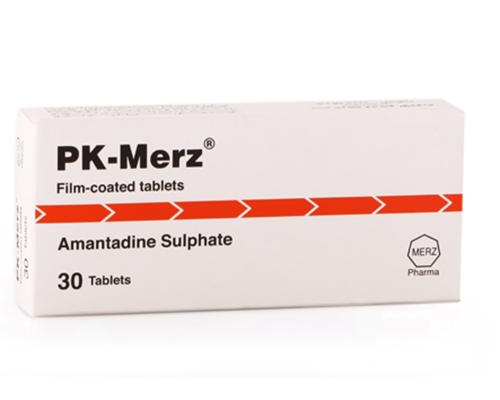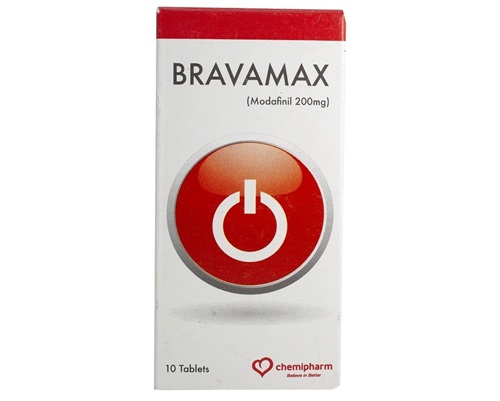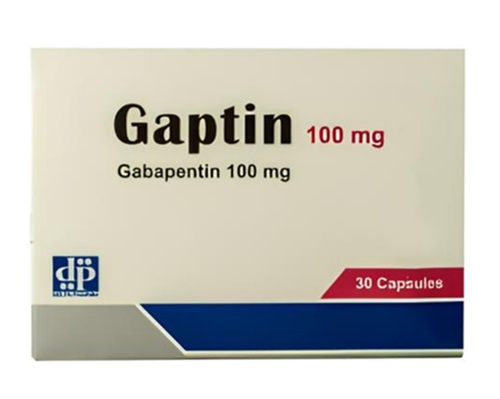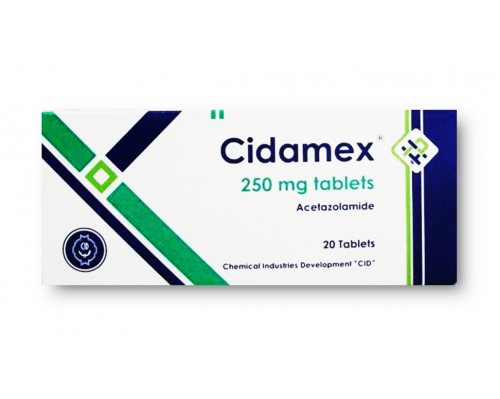Description
Tradename:
PK-Merz
Compound:
Each tablet contains:
Amantadine sulfate 100 mg.
Auxiliary components:
Lactose monohydrate, microcrystalline cellulose, potato starch, gelatin, povidone, talc, magnesium stearate, colloidal silicon dioxide, croscarmellose sodium, titanium dioxide, color.
Properties:
Amantadine has various pharmacological properties. It has indirect striatal dopamine receptor agonist properties. Animal studies have shown that amantadine increases extracellular dopamine concentrations both by increasing dopamine release and by blocking reuptake in presynaptic nerve cells. At therapeutic concentrations, amantadine inhibits NMDA receptor-mediated acetylcholine release and may thus have anticholinergic effects. Amantadine exhibits a synergistic effect with levodopa.
Indications:
Parkinson’s syndrome: treatment of symptoms of Parkinson’s disease such as rigidity, tremors, hypokinesia and akinesia. Extrapyramidal side effects of neuroleptics and other drugs: early dyskinesia, akathisia and parkinsonism.
Directions for use and dosage:
PC-Merz tablets are taken with a small amount of liquid, preferably in the morning and afternoon. The last daily dose should not be taken after 16:00. Before starting, as well as after 1 and 3 weeks of treatment, an ECG (50 mm/s) and frequency correction of Q-T time (Q-Tc) according to Bazett should be done, which is determined manually. This ECG should be done before any subsequent dose increase and 2 weeks after it. In the future, an ECG must be performed at least once a year.
Treatment should begin with taking 1 tablet (100 mg amantadine sulfate) per day for the first 4–7 days, with a further increase in the daily dose by 1 tablet once a week until an effective therapeutic dose is reached. The usual effective dose is 1-3 tablets 2 times a day (200-600 mg amantadine sulfate).
Contraindications:
Liver failure, chronic renal failure, psychosis (including history), thyrotoxicosis, epilepsy, angle-closure glaucoma, prostatic hyperplasia, arterial hypotension, chronic heart failure stage II-III, state of agitation, predelirium, delirious psychosis, I trimester pregnancy, lactation, simultaneous use of triamterene and hydrochlorothiazide, hypersensitivity to amantadine.
Precautionary measures:
Use with caution in patients with impaired renal function, when used simultaneously with other antiparkinsonian drugs, as well as in the elderly. In such cases, adjustment of the amantadine dosage regimen is required. In patients with hyperreflexia, treatment should be withdrawn gradually.
Side effects:
Headaches, depression, visual hallucinations, motor or mental agitation, convulsions, irritability, dizziness, sleep disorders, tremors, mental disorders accompanied by visual hallucinations, decreased visual acuity.
Development or worsening of heart failure, anorexia, nausea, constipation, dry mouth. Difficulty urinating; polyuria, nocturia.
Dermatosis, the appearance of a bluish color of the skin of the upper and lower extremities.
Storage method:
Store at a temperature not exceeding 30 degrees.









